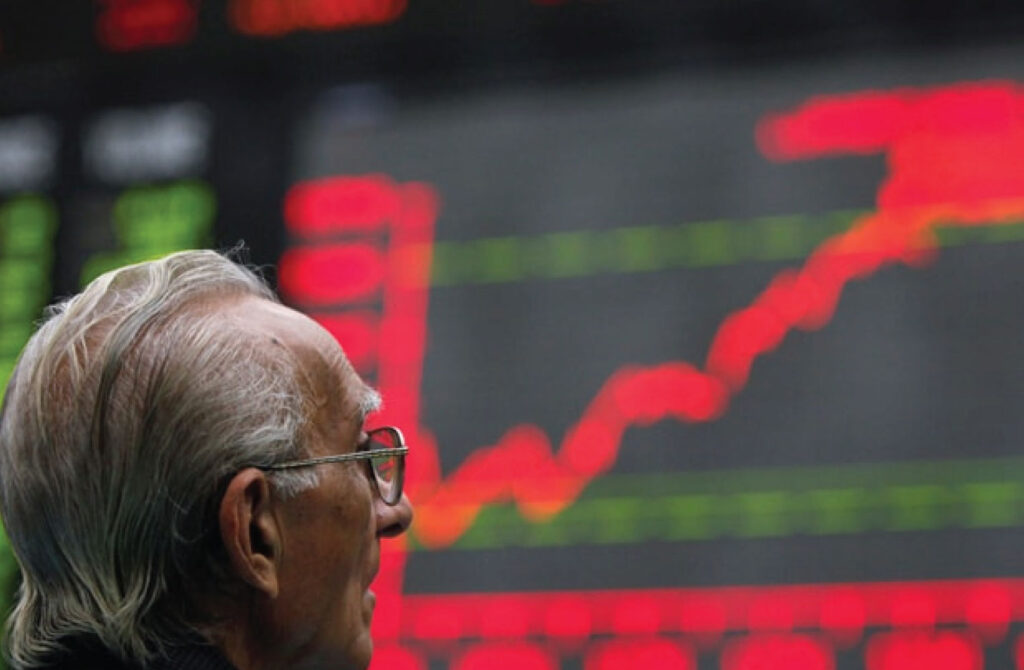Arif Habib Limited (AHL), a prominent brokerage and investment banking firm, foresees the Pakistan Stock Exchange’s (PSX) benchmark KSE-100 index reaching 81,000 by December 2024. The firm’s report, titled “Targeting 81,000; Resilience and Redefined,” attributes this projection to robust earnings growth, attractive valuations, significant domestic liquidity, and relatively stable economic growth, anticipating an appealing total return of 32 percent in 2024.
AHL’s survey on key stakeholders’ expectations regarding Pakistan’s macroeconomic indicators and the capital market for 2024 revealed that 61 percent anticipate the KSE-100 index closing above 70,000 points by the end of December 2024. Additionally, 36 percent expect it to close between 65,000-70,000 points, while the remaining 4 percent predict it closing below 57,000.
The report identifies major themes for 2024, including compelling valuations, substantial domestic liquidity, and improving macros alongside monetary easing. AHL projects double-digit earnings growth across various sectors, with an overall expected earnings growth of 17.2 percent for KSE-100 in 2024.
Within specific sectors, the banking sector is poised for an 18.8 percent jump, driven by higher average interest rates, increased non-market income, and prudent provisioning. Cement and Steel sectors are expected to experience substantial gains (43.8 percent and 13.5 percent, respectively) due to rising demand, stable product prices, and the initiation of a monetary easing cycle. The fertilizer sector is anticipated to see a 15.6 percent earnings growth, benefiting from improved margins and pricing power.
In the energy sector, Exploration and Production (E&P), Oil Marketing Companies (OMCs), and the Power sector are expected to benefit from gas and electricity tariff hikes, resulting in enhanced cash flows. The textile sector is likely to be driven by higher utilization and increased export orders, while the refinery sector stands to gain from the implementation of the brownfield refinery policy and improved Gross Refining Margins (GRMs).
The report underscores that the KSE-100 index currently presents an attractive investment opportunity with a Price-to-Earnings (PE) multiple of 4.1x, notably lower than its 5-year and 10-year averages of 6x and 8x, respectively. Furthermore, the Price-to-Book (PB) multiple for the KSE-100 index is at an all-time low of 0.7x, indicating stocks are priced well below their book values.
Additionally, the current dividend yield is an impressive 11 percent, significantly higher than the five-year average of 6 percent. Considering these metrics, the KSE-100 index appears to offer a compelling investment opportunity, supported by a combination of low valuation multiples and an attractive dividend yield.
The Bond Equity Earnings Yield Ratio (BEER) for Pakistan is at 0.63, one of the lowest in the last 10 years, with the KSE-100 index Earnings Yield (EY) at 23.8 percent and secondary market yields (10-year PIBs) at 15.0 percent. Comparing it with the BEER averages of the last 5, 10, and 15 years suggests a potential upside of 12 percent, 28 percent, and 32 percent, respectively, assuming BEER reverts to its mean average.
The Market Capitalization to GDP Ratio for Pakistan’s equity market indicates significant room for expansion, currently standing at 16 percent, notably lower by 9 percentage points than the historical average. Reversion to the mean ratio could result in incremental market cap, with every 1 percent change in market cap to GDP ratio expected to increase market cap by PKR 946 billion or a 10.4 percent upside potential.
Moreover, assuming the market cap to GDP reverts to its mean (5-year; 11.2 percent), it could result in an incremental market cap of Rs. 1,818 billion, implying an upside potential of 20.9 percent from current levels.
The report also discusses the strategic preference for share buybacks by companies in the current high-interest-rate environment. Share buybacks are favored over expensive growth initiatives due to the advantageous low Price-to-Book (PB) ratio. Companies engaging in share buybacks enhance shareholder value and signal confidence in their stock, leveraging price inefficiencies to their advantage.
Since 2022, twelve companies have announced buybacks with a cumulative value of around Rs. 59 billion. From 2022, the companies purchased shares worth Rs. 45.5 billion, with LUCK being the largest buyback at Rs. 15.6 billion, followed by ENGRO with a cumulative value of Rs. 11.6 billion (dividend-adjusted: Rs. 10 billion). The remaining buybacks, expected to be Rs. 4.1 billion, are anticipated to provide liquidity in the market.
The report anticipates more buybacks, considering the attractive valuation even after a 48.8 percent rally since FY24TD, which is still very competitive and can potentially outperform new projects’ Internal Rate of Return (IRR) in the mid to long term.
Looking ahead, the report expects an increase in Initial Public Offerings (IPOs) in 2024, driven by anticipated monetary easing and improved valuation multiples. Approximately 5-6 new IPOs are projected in sectors such as Cable and Electrical Goods, Textiles, Consumer, Pharma, Technology, and Logistics, with an estimated capital raising of approximately Rs. 8-12 billion.
In summary, AHL’s comprehensive report paints a positive outlook for Pakistan’s stock market, underlining potential opportunities for investors across various sectors. The projected growth is supported by robust earnings, attractive valuations, and strategic market dynamics, making it a compelling narrative for those eyeing investment opportunities in the country.
